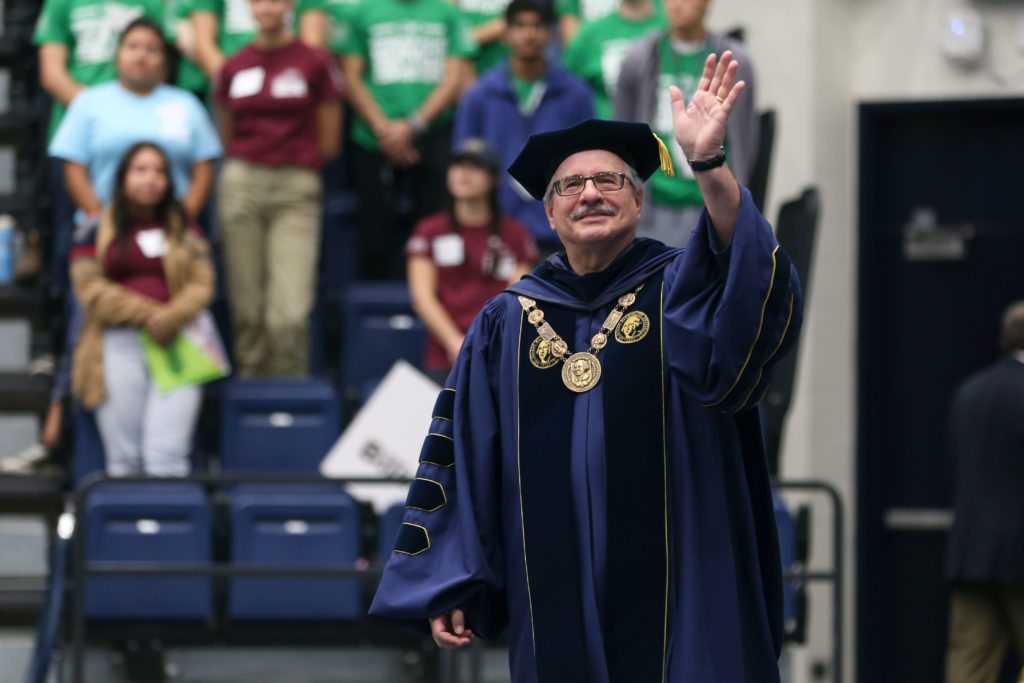While serving as provost at the University of Miami, University President Thomas LeBlanc said his biggest fear was that a student would get hit by a car on a nearby highway.
But at GW, LeBlanc said he is more concerned that a student will post something inappropriate on social media – and ruin their reputation, friendships and career prospects because of it.
“I worry that our students will make a mistake that will haunt them forever,” he said.
In his first formal address to the Class of 2022 at convocation Saturday, the University president’s remarks focused heavily on one issue: the repercussions of social media. LeBlanc said that while officials aren’t launching any formal steps to educate students about the topic, he will continue to speak about the dangers of online posts throughout the year after a spring semester full of controversial online activity.
A Snapchat post caused a firestorm on campus in February after a member of Alpha Phi was pictured holding a banana peel with the caption “Izzy: ‘I’m 1/16 black.’” The post quickly spread around campus and sparked action from both the administration and the Student Association to improve diversity and inclusion on campus.
The SA election brought another round of online incidents later in the spring.
Former SA executive vice presidential candidate Brady Forrest was accused of anti-Semitism after students resurfaced two Facebook posts he wrote in 2014 calling for a boycott of a multicultural event because Jewish student organizations were involved. Two days later, former SA senator and presidential candidate Imani Ross apologized for “offensive” posts about minorities that she posted in 2012 and 2013 – when she was as young as 13.
Forrest and Ross did not return multiple requests for comment.
LeBlanc told faculty members at a Faculty Senate meeting Friday that he plans to address social media use with students throughout the year in part because he realized that nearly all first-year students have always lived in the era of the iPhone.
“Every freshman has to apologize for something they published when they were 13, and that is going to have consequences,” he said.
LeBlanc said social media has taken away opportunities for students to learn during college because mistakes that they make can be shared widely and be easily attacked. He said misusing social media can lead to permanent consequences – including lost job opportunities.
He added that students do not understand that personal communications, like instant messages, can be spread to social media without students’ consent but still have the same career and social repercussions.
“The people who disagree with you will come after you like rabid dogs,” he said. “That’s not how it used to be on a college campus.”
LeBlanc said he doesn’t have any formal way to measure the effect of starting a conversation about social media use on campus – but that he hopes students will “pause and think” before posting.
Caroline Mehl – the director of the OpenMinds Platform, an educational firm that offers health and social welfare training – said students may feel more empowered to attack one another after a social media mishap because users don’t interact face-to-face online. She said having a large social media following often has negative consequences for a student because instead of engaging with other users and learning from one another, they feel a need to perform.
“There’s a delicate balance between how do you create a community out of a diverse cohort of students, but how do we do that in a way that’s respectful and also in a way that allows us to engage with new experiences, new cultures in a way that encompasses individual growth,” she said.
Andrew Selepak, the director of the online master’s program in social media at the University of Florida, said most professors educate their students about how businesses look through social media accounts and make employment decisions based on the content. He said this type of training should educate students about a university’s core values to ensure that students understand that their actions could also reflect negatively on their institution.
“It’s important that the university discuss what it means to be a member of the university community and the traditions of the school,” he said.





